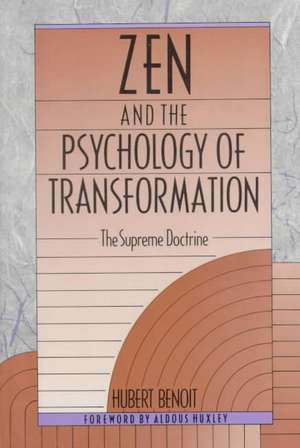Zen and the Psychology of Transformation: The Supreme Doctrine
Autor Hubert Benoit Aldous Huxleyen Limba Engleză Paperback – 28 feb 1990
The approach of psychology and psychotherapy is based on "statistical normality," or the behavior of the greatest number. In an effort to conform, we focus on our problems rather than our possibilities, emulating a norm that falls drastically short of our full capacity for development.
Oriental thought, and Zen thought in particular, seeks to activate the true potential of men and women--to transform our lives, and thereby enable us to shed our problems and suffering.
"The Supreme Doctrine" applies the essence of Oriental Wisdom to the pursuit of self-knowledge and transcendence. The first step in a holistic psychology is to begin examining the true "state of man," rather than its aberrations. In so doing, we can give new direction and purpose to our lives.
The author does not advocate "conversion" to Eastern thought, but rather an integration of East and West, wherein Western psychological thinking and reasoning can be enriched and clarified by Oriental wisdom.
Preț: 107.00 lei
Nou
20.47€ • 21.43$ • 16.94£
Carte disponibilă
Livrare economică 17-31 martie
Specificații
ISBN-10: 0892812729
Pagini: 264
Dimensiuni: 154 x 231 x 20 mm
Greutate: 0.37 kg
Ediția:Revised
Editura: INNER TRADITIONS INTERNATIONAL
Notă biografică
Recenzii
Textul de pe ultima copertă
Zen Psychology"Dr. Benoit has reason to be confident that the ancient Zen masters would have given him their imprimatur. He has understood their secret and made it his own. He invites us most searchingly to do the same."--London TimesMan cannot live fully until he has considered the great questions of life. It is for this reason that we turn to Western psychology and metaphysics for help in solving our problems. The approach of psychology and psychotherapy is based on "statistical normality," or the behavior of the greatest number. In an effort to conform, we focus on our problems rather than our possibilities, emulating a norm that falls drastically short of our full capacity for development. Oriental thought, and Zen thought in particular, seeks to activate the true potential of men and women--to transform our lives, and thereby enable us to shed our problems and sufferings.The Supreme Doctrine applies the essence of Oriental wisdom to the pursuit of self-knowledge and transcendence. The first step in a holistic psychology is to begin examining the true "state of man," rather than its aberrations. In so doing, we can give new direction and purpose to our lives.The author does not advocate "conversion" to the Eastern thought, but rather an integration of East and West, wherein Western psychological thinking and reasoning can be enriched and clarified by Oriental wisdom."DR. BENOIT has discussed the 'supreme doctrine' of Zen Buddhism in the light of Western psychological theory and Western psychiatric practice. This is a book that should be read by everybody who aspires to know who he is and what he can do to acquire self-knowledge."
Cuprins
Author's Preface
1. On the General Sense of Zen Thought
2. 'Good' and 'Evil'
3. The Idolatry of 'Salvation'
4. The Existentialism of Zen
5. The Mechanism of Anxiety
6. The Five Modes of Thought of the Natural Man--Psychological Conditions of Satori
7. Liberty as 'Total Determinism'
8. The Egotistical States
9. The Zen Unconscious
10. Metaphysical Distress
11. Seeing into One's Own Nature--The Spectator of the Spectacle
12. How to Conceive the Inner Task According to Zen
13. Obedience to the Nature of Things
14. Emotion and the Emotive State
15. Sensation and Sentiment
16. On Affectivity
17. The Horseman and the Horse
18. The Primordial Error or 'Original Sin'
19. The Immediate Presence of Satori
20. Passivity of the Mind and Disintegration of our Energy
21. On the Idea of 'Discipline'
22. The Compensations
23. The Inner Alchemy
24. On Humility
Epilogue
Index
